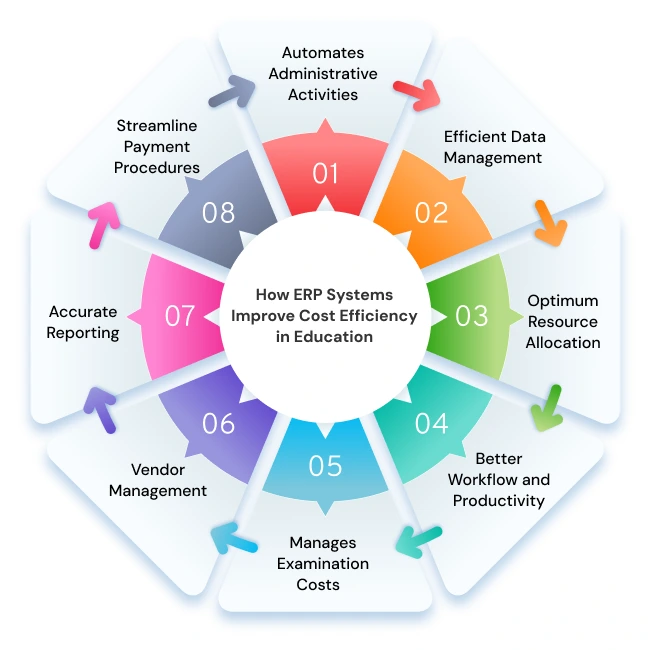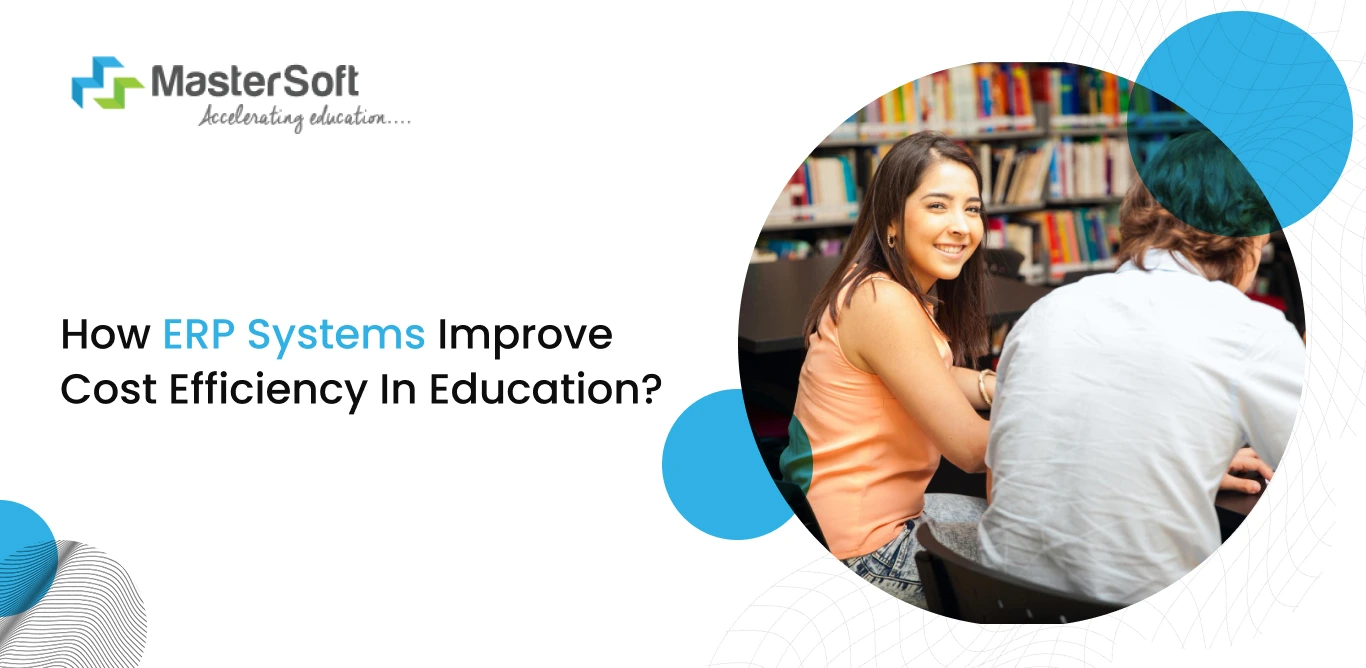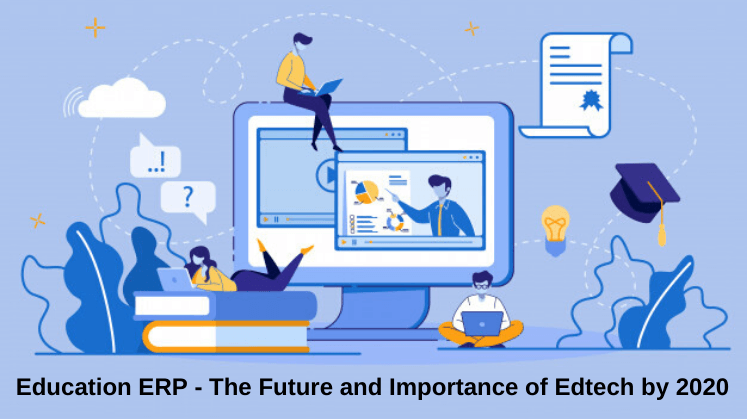09, Dec 2024
Educational institutions prioritize hiring competent staff and faculty who can deliver targeted tasks within a stipulated time. However, carrying out multiple activities simultaneously with precision and accuracy can become overwhelming for institute team members.
Furthermore, the institute's management often needs to deliberately consider their investments that can ensure long-term benefits. The key is to assess the organizational requirements and implement mechanisms that can enhance educational and administrative activities equally. That is where the ERP system proves to be an ideal tool by reducing the cost of many labor-intensive tasks.
But how does the ERP system improve the cost efficiency of educational institutes? Let us find out:

1. Automates Administrative Activities
The admission process is one of the central procedures that can be tedious and exhausting, especially if an institute relies on conventional approaches. On top of that, paper-based processes are costly, owing to the manual printing and handling of documents.
In contrast, ERP software automates the end-to-end enrollment process by facilitating an online admission system, allowing students to apply and upload their documents. The system generates a list of shortlisted candidates, depending on pre-established criteria.
Additionally, it automates the fee collection mechanism, allowing students to pay the admission fees online. Also, the system simplifies payroll by automating calculations and generating payslips, streamlining salary payment for staff.
2. Efficient Data Management
Student, faculty, and staff attendance records, financial reports, admission reports, financial data, expenditure, and investment data are crucial data that institutes maintain. Institutes invest in storage space and staff to store and manage such documents.
Paper-based documents are prone to damage, which might incur tremendous financial loss. Instead, they can invest in software that digitalizes all documents. The software provides a centralized database, enabling institutes to store student information, course catalogs, faculty details, financial records, etc., efficiently.
What’s more, the system incorporates data from core institution functions, including admission, finance, academics, and human resources, into a single platform. Consequently, different department members can access accurate information in real-time. They can make data-driven decisions, leading to accurate resource allocation and budget planning.
Overcoming Challenges In Indian Higher Education
3. Optimum Resource Allocation
The lack of mechanisms to determine whether the allocated resources have led to the set outcomes or not can be detrimental to institutes. For instance, it can cause inconsistencies, underutilisation of resources, staff dissatisfaction and exhaustion, etc.
Thankfully, leveraging ERP system can lead to optimum resource allocation in the following ways:
- Automating the creation of class schedules by considering factors like faculty availability, student preferences, and examinations.
- Conducting timely inventory management, helping to maintain accurate records and reduce resource wastage.
- Real-time financial reports provide insights into revenue and expenditure, improving budgeting and cost control.
4. Better Workflow and Productivity
Educational institutes rely on the smooth functioning of multiple operations; therefore, the staff must work effectively to avoid procedural delays. Overdependence on conventional approaches (paper-based processes) can lead to procedural delays.
That is where tools like the education ERP can make a notable difference by consolidating various institutional data and providing crucial insights into performance indicators. It provides a common platform for different department members to communicate effectively, helping to eliminate miscommunication.
Besides, it automates day-to-day tasks, allowing staff to pay attention to other necessary initiatives and activities.
5. Manages Examination Costs
Conducting pre- and post-examination activities can be resource-intensive, especially if institutes rely solely on traditional approaches. An ideal solution lies in incorporating ERP solutions to automate timetables and exam schedules while ensuring room availability.
Institutes can facilitate an online examination system apart from traditional (in-person) exams, helping to evaluate students regularly without additional costs. Moreover, educators can use the system to automate grading, reducing grading time.
Teachers can communicate grades or results to students and parents effectively through the tool, eliminating the need for paper-based reports and speeding up the sharing process. Additionally, it reduces manual errors in grading, allowing teachers more time to focus on instructional methods and strategies.
Things You Need to Know When Choosing an Educational ERP
6. Vendor Management
Institutes associate with various agencies and organizations to cater to their academic and administrative requirements. Therefore, maintaining an accurate system to track transactions and existing inventory is crucial.
The software provides effective vendor management functionality by creating a centralized vendor list with associated details. It sends automated reminders for restocking or upgrading from a particular vendor. Notifications of purchase discounts enable institutes to secure lower prices on supplies and allocate funds to educational initiatives.
Also, notifications of purchase discounts enable institutes to secure lower prices on supplies and allocate funds to educational initiatives.
7. Accurate Reporting
Complying with financial regulations is crucial for educational institutes to avoid tax-related penalties. ERP systems provide centralized data storage and accurate reporting on tuition fees, donations, grants, and additional revenue sources.
Furthermore, the system streamlines financial information with accurate records, including receipts, invoices, and bank statements, simplifying the audit process. As a result, it helps to avoid potential penalties and reduce unanticipated scrutiny.
8. Streamline Payment Procedures
Students and parents prefer to pay fees online, making a safe and convenient fee payment system essential. Traditional paper-driven fee systems often incur additional costs.
Integrating the institute’s banking system with an education ERP automates the fee payment process and provides the following facilities:
- Facilitates a safe and effective fee payment system.
- Generates and sends fee payment receipts to individual students.
- Digitalized storing and maintaining all fee-related information, eliminating error-prone manual data entry.
- Sends timely reminders of upcoming deadlines, enabling students to pay fees on time.
Why Choose MasterSoft ERP Solutions?
A robust ERP system is an appropriate solution to administrative burdens and improving overall institutional efficiency. However, the real challenge lies in identifying an ideal tool, especially when the ed-tech space is brimming with new software. That is where MasterSoft’s ERP solutions reign supreme, thanks to their superlative features, such as:
- Streamlined Financial Management
- Analytic Reporting on academic performance, fees, attendance, leaves, etc.
- Centralized database
- Enhanced Connectivity
- Facilitates easy compliance with regulatory requirements
- Data-driven insights into student performance
The state-of-the-art modules of the system improve the core functionalities of educational institutes and identify obstacles. Moreover, MasterSoft’s team of experts is dedicated to catering to the specific requirements of institutes and simplifying digital transformation.
Still wondering what it takes to get a NIRF ranking?
Mobile: 08448010216
Email: janki.somani@iitms.co.in










